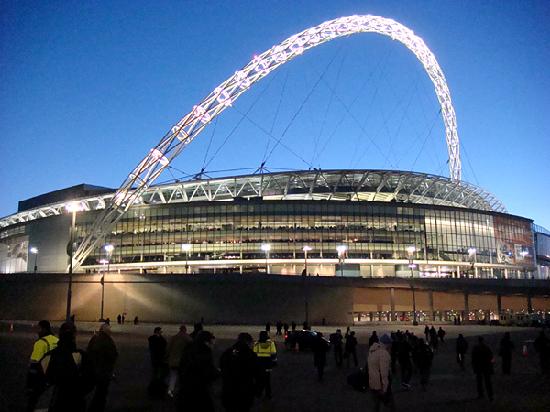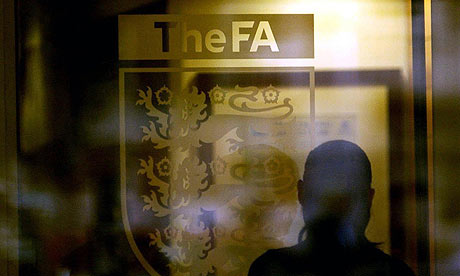The imminent arrival of Wembley chairman David Bernstein in the same post at the English Football Association (FA) has sent me scurrying to the FA’s accounts.
Does the national stadium now cast such a long shadow over the activities of the game’s original governing body that it might help to explain Bernstein’s surprise nomination?
Is the Wembley tail now wagging the FA dog?
Well, I’ll leave you to supply your own answers to those questions, but this is what the accounts for the year to December 2009 tell us.
“Stadium and event management” is now a £100 million-pound business, accounting for almost £102 million of turnover, against £232.5 million from “Promotion of Association Football”.
There is some overlap, such as when the FA pays Wembley staging fees, bringing overall FA turnover for the year to around £314 million, similar to the sort of sums generated by the very biggest European football clubs.
Group expenditure was marginally lower than this at £308 million – of which governance, what you might think of as the association’s original core business, made up just a tiny fraction, with spending on a category labelled “governance and development” put at £11 million.
But of course, the most critical impact of Wembley on the FA’s business is its debt.
This explains why, though stadium and event management produced a decent operating margin of more than nine per cent (up from less than seven per cent a year earlier), the activity’s contribution at the pre-tax level was a £15.6 million loss.
When Wembley’s loan was refinanced in September 2008, the amount outstanding was put at £341.5 million.
Looking at Notes 15, 16 and 24, it looks like this was still the amount on January 1, 2009, once unamortised arrangement fees are included.
Note 17 discloses that an interest rate swap has fixed the rate on this at 6.922 per cent a year.
This should have amounted to £23.6 million in 2009 (if no principal were repaid until the end of the year) – and Note 7 shows this is precisely the sum of bank interest payable.
Note 16 tells us that the “group bank loan…is repayable in instalments over the 15 year term” and that “each annual repayment will include a mandatory amount, together with a targeted amount based on performance”.
By December 31, 2009, the bank loan had fallen to £324.9 million, with £16.6 million apparently repaid.
Sure enough, in the consolidated cash flow statement you find an outflow of £16.628 million labelled “Bank loan paid”.
Since at December 31, 2008 the FA had £11.8 million in bank loans falling due within one year, this suggests that it repaid more than the mandatory amount, implying that it is comfortable with the repayment schedule.

And while the consolidated balance sheet states that the FA’s cash in hand and at bank has plunged in the space of a year from £132.8 million to £65 million, this appears to have been largely due to a reclassification of £60 million of short term treasury deposits.
The trouble is that in 2009 the FA had only a £5.8 million operating profit with which to cover its £26 million-plus bill for interest payable “and similar charges”.
It was spared a really substantial pre-tax loss (such as the £15.3 million booked in 2008) only by a £16.6 million exceptional credit.
The explanation for this credit – Note 8 says it was “in relation to contracts with two of the FA’s broadcasters, Setanta and Gateway, which went into administration and liquidation respectively during 2009” – gives even more grounds for concern since it points to potentially tough times ahead.
Broadcasting, after all, was much the biggest contributor to FA turnover in 2009, generating £133 million.
If this contribution is set to fall, what chance does the FA have of generating the sort of operating profit it needs to cover the interest on its bank loan without running up several more years’ of pre-tax losses?
We probably won’t get the 2010 numbers until about September, but let’s take a stab at what they might say.
Based on what I have read about Setanta and the ESPN deal that replaced it, my guess is that broadcasting income will be down, though perhaps only by single-digit millions.
In a World Cup year, sponsorship and licensing (£50 million in 2009) may ratchet up a notch or two, with gate receipts (2009: £22 million) maybe flat.
Based on event calendars on Wembley’s website, 2010 seems to have been a relatively quiet year for rock concerts after a bumper 2009, so I would think 2009’s events revenue of £19 million is unlikely to be matched.
Any downturn here, though, may be offset by a continued increase in revenues from Club Wembley premium seats, which reached £66 million in 2009.
At December 31 2009, 91 per cent of premium seats were contracted, up from 87 per cent a year earlier.
All told then, I think 2010 revenues for the FA may come down from £314 million to somewhere in the £300-£310 million range.
The good news is that expenditure, which reached £308 million in 2009, looks set to fall as well.

This is partly because a £17 million one-off expense related to the move out of the body’s former Soho Square headquarters (pictured) and incurred in 2009 will not be repeated.
That said, the wording in the accounts makes me wonder whether some further expenditure relating to this might be incurred at some point if rent received from Soho Square tenants falls below estimates.
Costs related to Wembley might also fall somewhat if I am right in thinking 2010 was a quieter year for non-sports events at the venue.
The accounts also say that FA Cup prize money was reduced in 2009-10 and that “certain payments” to the Football Foundation had been deferred by 12 months.
There has also been what the directors’ report calls “a wide ranging expenditure review”, though the impact of this may have been offset by a higher bill for the ill-fated 2018 World Cup bid and, given that it was a World Cup year, probably Club England.
Taking this all into account then, I could see 2010 expenditure coming in at somewhere in the £280-285 million range.
This should produce a respectable operating profit – perhaps even enough to cover an interest bill of something like £22.5 million.
There will also be a debt repayment of what looks like £12.4 million to take into account.
Beyond this, though the World Cup bid will disappear from the cost equation, the uncertain outlooks for the overall economy, for broadcasting rights valuations and for the perennially disappointing England team will not make cranking up revenues particularly easy, even with a Champions League final and the Olympic Games on the horizon.
I think sponsorship and licensing revenue may do well to tread water in 2011 and some Club Wembley members may struggle to afford their posh seats – while a recent news item suggested that rock concert sales were on the slide (although Wembley already has Take That booked in for eight nights in June and July).
Finally, if the worst did come to the worst, as the directors’ report spells out with utmost clarity, “the overall mitigating factor for the group is the significant level of discretionary expenditure in the FA’s cost base.
“A significant element of the FA’s expenditure is investment into the game and can be reduced without breaching legal commitments.”
Any such cuts would probably engender a fearful hoo-ha, however, and I imagine the FA top brass would want to avoid them if at all possible.
All of this is a long-winded way of saying that, while the FA may perfectly well be able to amble along while shouldering the Wembley debt even in today’s uncertain economic climate, it is likely to prove hard work and if it wants to give itself more room for manoeuvre, there may be quite a lot to be said for embarking on a more strategic course of action.
By this I mean maybe selling stadium naming rights, or a minority stake in Wembley, or enticing a big Premier League club such as Chelsea or Tottenham to become long-term tenants.
Perhaps even a combination of two or all three of these.
I don’t know whether such ideas have entered the FA leadership’s thinking, but if they have, or if they do, then a man who knows the Wembley business as well as Bernstein is probably not a bad person to have at the helm.
David Owen worked for 20 years for the Financial Times in the United States, Canada, France and the UK. He ended his FT career as sports editor after the 2006 World Cup and is now freelancing, including covering the 2008 Beijing Olympics and 2010 World Cup. Owen’s Twitter feed can be accessed at www.twitter.com/dodo938

.jpg)